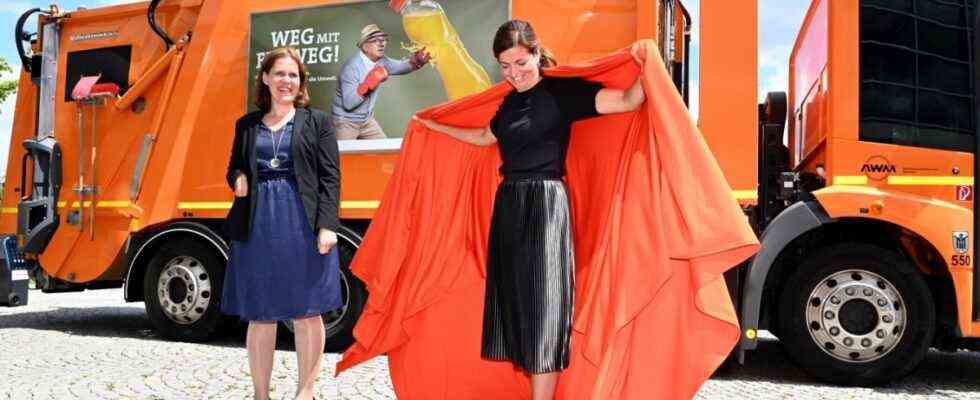If it just could be that easy. “Away with one-way!” is on the new posters of the Munich waste management company (AWM), and a man in a hat and boxing gloves gives an oversized plastic bottle a juicy left. You want to declare war on the disposable plastic, said local officer Kristina Frank (CSU) on Friday in front of the AWM headquarters on Georg-Brauchle-Ring, where she and Mayor Verena Dietl (SPD) presented the new advertising campaign for the city’s operations.
She herself is a sports freak, says Frank, and that’s one of the reasons why these motifs are. The other posters show a man kicking a to-go coffee mug with a powerful kick, and a woman beaming with joy, kicking a Tetra-Pak with milk until it splatters.
Kristina Frank would probably not fail if Munich could solve its garbage problem like Jürgen Klinsmann once did in the Olympic Stadium with his step into an advertising bin. But it’s not that easy. At the beginning of July 2020, the city council decided to turn Munich into a “Zero Waste City”, a city without rubbish. By 2022, the AWM is working with several partners to develop a concept on how the city can achieve this goal. There are no interim results yet, said Mayor Dietl. The city must support citizens in using less rubbish in everyday life. And one thing is clear: many small and large steps will still be necessary on the way to the “Zero Waste City”.
The legislature recently took one of these steps: From 2023, restaurants and retailers must also offer food and beverages in reusable containers, the Bundestag decided in May. And as of this Saturday, it will be forbidden to manufacture certain disposable plastic products, including disposable knives and forks, to-go cups, fast food boxes, drinking straws and cotton swabs. Shops are only allowed to sell what they have already stored. The AWM estimates that in Munich there are almost 2,000 tons of waste per year.
Frank believes that the problem with disposable tableware has not yet been banned by the legal ban
Of course, that is a very small part of the Munich garbage heap. The municipal AWM alone disposes of 430,000 tonnes of waste annually, and what is thrown into recycling bins or rubbish bins in streets and squares or in parks is added. Part of this mountain, however, consists of paper, single-type plastic or organic waste, i.e. material that can be easily recycled or composted. Disposable tableware and plastic to-go packaging, on the other hand, are often more difficult to process – and they tend to end up in nature.
Frank believes that the problem with disposable tableware has not yet been banned by the legal ban. Some people will just change the material and use drinking straws made of wood instead of plastic. That is better; but it is best when garbage does not arise in the first place. That is why the AWM campaign should now motivate Munich residents to switch from disposable to reusable. The motifs can be seen in subway stations, on advertising pillars, in cinemas, in magazines and on garbage trucks. In addition, the city council decided in May, among other things, to help innkeepers convert to reusable containers, with advice and possibly also financial aid.
In addition, the AWM has also revised its website. The homepage now explains in twelve languages where which garbage belongs, how you can shop sustainably and repair things – and when the recycling centers are open.

